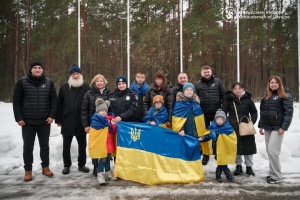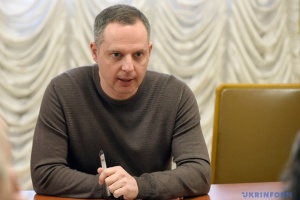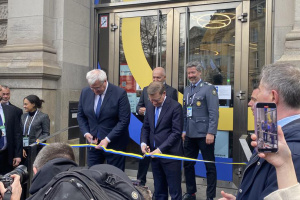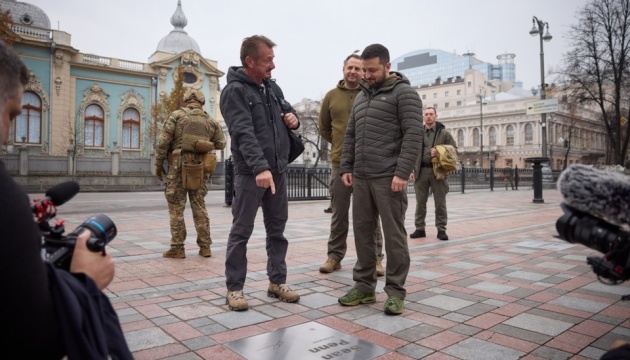
How international art community supports Ukraine, spreading truth about war
In March 2022, the Stand Up for Ukraine programme was launched, initiated by the Government of Canada and the European Commission at the request of the President of Ukraine. In addition to politicians and public figures, world stars of show business joined it. Among them: Elton John, Celine Dion, Katy Perry, Metallica, Miley Cyrus, Ozzy Osbourne, Billy Eilish, Klaus Meine, Radiohead, Red Hot Chili Peppers, One Republic, and others. They picked up the hashtag #standupforukraine and spread their posts about the need to support Ukraine among millions of users, raising billions of euros in aid. However, this was only the beginning.
The unexpected song of Andrii Khlyvniuk with the legendary band Pink Floyd to the lyrics of the folk song Chervona Kalyna was recorded at the initiative of the lead singer and guitarist of the band, David Gilmour. The song became almost an anthem of the inevitable victory of Ukrainians in the war. Then the events unfolded one after another: U2 soloist Bono in a duet with Taras Topolia sang at a concert in the capital’s underground, actress Angelina Jolie ran to the bomb shelter during the air raid in Lviv, where she came as a UN ambassador to meet with refugees, actor and director Sean Penn walked around Kyiv with a camera in the company of President Volodymyr Zelenskyy.
Each public reaction of celebrities to the armed aggression in Ukraine drew the world’s attention to the war and spoke about the realities of our opposition to the enemy. Anti-war rhetoric was especially valuable on the part of artists, without urging us to reconcile through creativity. It is great that the celebrities understood this, and therefore they were and are with us in the desire to defeat evil.
A clear and expressive position, personal meetings with people and live impressions of the cities mutilated by the occupiers, which are shared on their social media profiles by many artists, actors, and directors, set up their supporters to analyze what is really happening in our country. Therefore, the stories about Ukraine in the celebrity’s account are not only a phenomenon that a few years ago could not be imagined, but also an authoritative source of influence on public opinion. Buying pickup trucks at the front, asking fans to donate to Ukrainians instead of gifts for significant dates, participating in charity events, and purposefully spreading Ukrainian culture is an incomplete list of what has been done. By the way, a favorite of several generations, French actress Catherine Deneuve, suddenly read a poem by Lesya Ukrainka from the stage of the Cannes Film Festival.
What result does it yield?
Today, despite the fact the media space is tired of hostilities, some cultural figures do not forget the topic of Ukraine in their social networks and continue to speak frankly about Russia as an aggressor country, making publications about terrorist attacks and genocide that resonate even among the least empathic audiences, refuting fakes invented by Russian propaganda, wearing accessories with Ukrainian symbols, and asking the world not to forget about the war.
In the context of our struggle not only for territories, but also for our values and national identity, the support of cultural figures becomes an information weapon in countering Russian propaganda about the so-called “one people.”
The diverse public activity of creative individuals arouses interest in Ukraine, forms ideas about it and its people, motivates the audience to realize the deeper reasons for our resistance, understand why we so zealously promote the rejection of the culture of the occupiers abroad and separate ourselves from everything connected to Russia, which seems to be something elitist to many in the world. With the help of culture, we can demonstrate our uniqueness. Last but not least, thanks to our unofficial ambassadors, the world is beginning to call things for what they are and finally distinguish us from the Russians.
Here is a selection of directors and photographers — daredevils — who risked visiting Ukraine and did a lot to further spread the truth about the war in the world.
Bernard-Henri Lévy, a famous French filmmaker, has visited Ukraine several times since 2014. After the full-scale invasion, his travels to the warring country became even more frequent due to his work on two documentaries: Why Ukraine, about the first days of the Russian offensive, and Glory to Ukraine. In this film, which has already premiered in the United States, the director showed the cities and villages of Kharkiv and Kherson oblasts that were under the occupiers. He even traveled along the front and introduced the viewer to soldiers and civilians who have lost everything but impress others with their resilience.
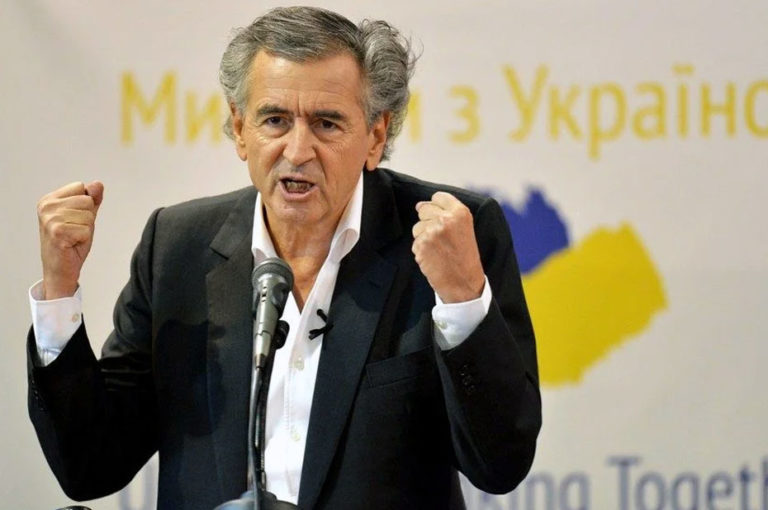
According to Bernard-Henri Lévy, he traveled without a previously thought-out route, but the only thing he and his crew were sure of was that the truth was on Ukraine’s side. The director has already transferred the royalties for the film to the Olena Zelenska Foundation, and the money will be spent on the reconstruction of the hospital in Izium. The author himself reported in an interview with Ukrainian journalists that this was a film against the so-called Ukraine fatigue.
Another director and famous actor, Sean Penn, was already in Ukraine on the day of the full-scale invasion because he was working on a documentary about Volodymyr Zelensky. However, the beginning of the full-scale war and the change in the role of the president in less than a day inspired the author to reformat the film. The director visited Kyiv several times and even presented his Oscar to the president, supporting Ukrainians after Zelenskyy’s request to speak at the 95th Oscar ceremony was rejected by the American Film Academy.
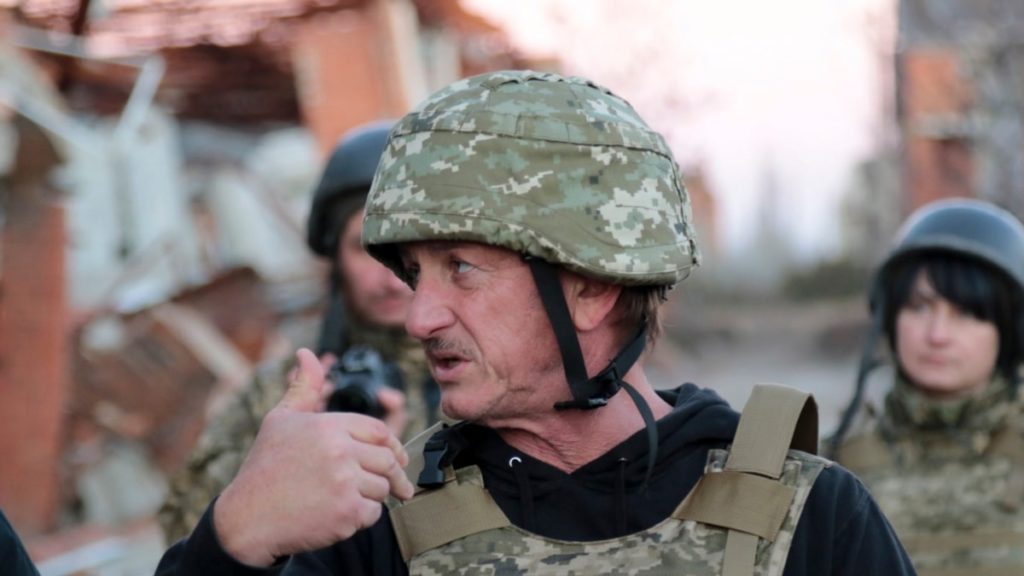
The film Superpower premiered at the Berlin Film Festival, marking the beginning of the invasion; it is about the desperate resistance of Ukrainians and their heroic struggle. In June, the film was first seen by Ukrainian viewers, and it will be released in other countries of the world in the future.
Howard Graham Buffett is an American philanthropist, farmer, and photographer, the son of Warren Buffett, a famous billionaire and founder of The Howard G. Buffett Foundation, which has already provided almost USD 200 mln in aid to Ukrainians. He managed to visit Ukraine more than once, his camera even saw the devastated Kherson Oblast and the shelled Kharkiv Oblast. Now, he is preparing to publish a photobook with photos, full of striking realism. It will be dedicated to the war in the center of modern Europe so that thousands could realize the tragic events in the life of the Ukrainian people and join to help.
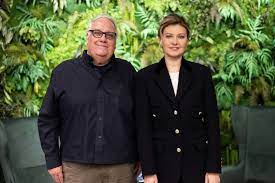
Beau Willimon, an American screenwriter and playwright who was one of the developers of the popular political series House of Cards, visited Ukraine as well. In Ukraine, he sought to collect material for a documentary that would tell the world about the war crimes of Russians. According to the website of the Bucha City Hall, Beau Willimon visited Bucha to document the atrocities of the Russian invasion and to film the heroic resistance of the Ukrainian people.
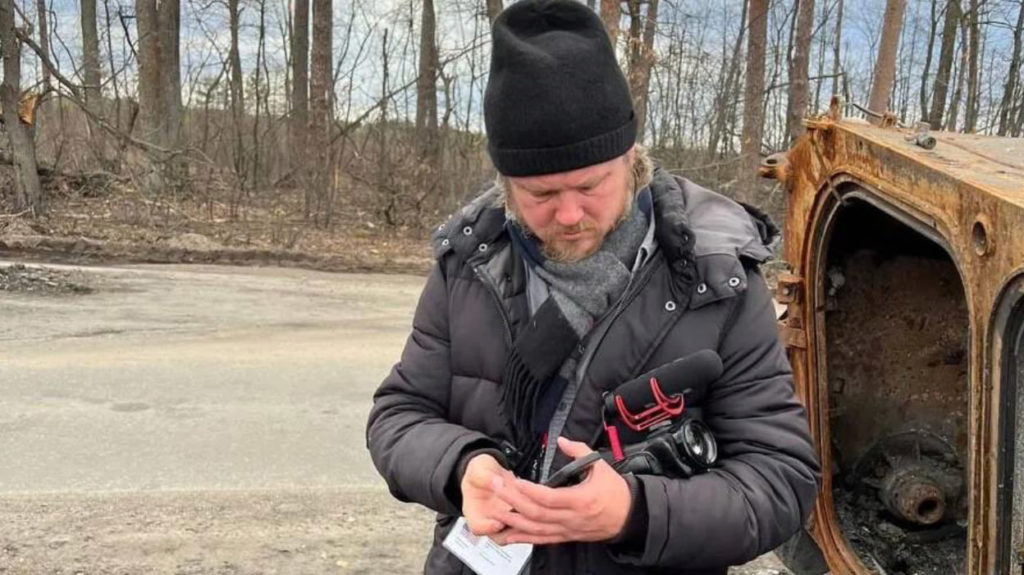
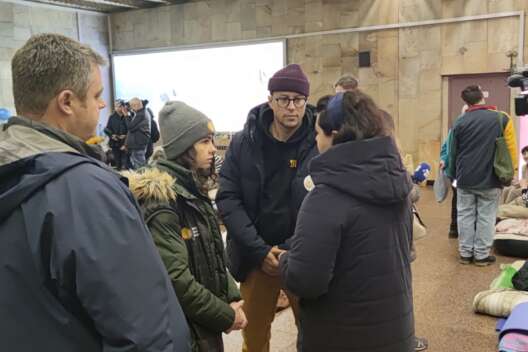
Cary Fukunagaga is another American director who was not afraid to come to Ukraine in the second week of the full-scale war and even stay for more than a month, although he came without a specific professional purpose. According to the director, he has long been interested in politics, felt the inevitability of these tragic events, and resented the international community, which, in his opinion, did not do enough to avoid Russia’s armed aggression.
He did not work on a film like others, but instead, he photographed people and the consequences of shelling and occupation of Ukrainian cities. His being in Ukraine actually turned into a humanitarian mission, in which he tried to show the world as many consequences of the war as possible, to evoke more empathy and assistance to Ukrainians.
Center for Strategic Communication and Information Security

